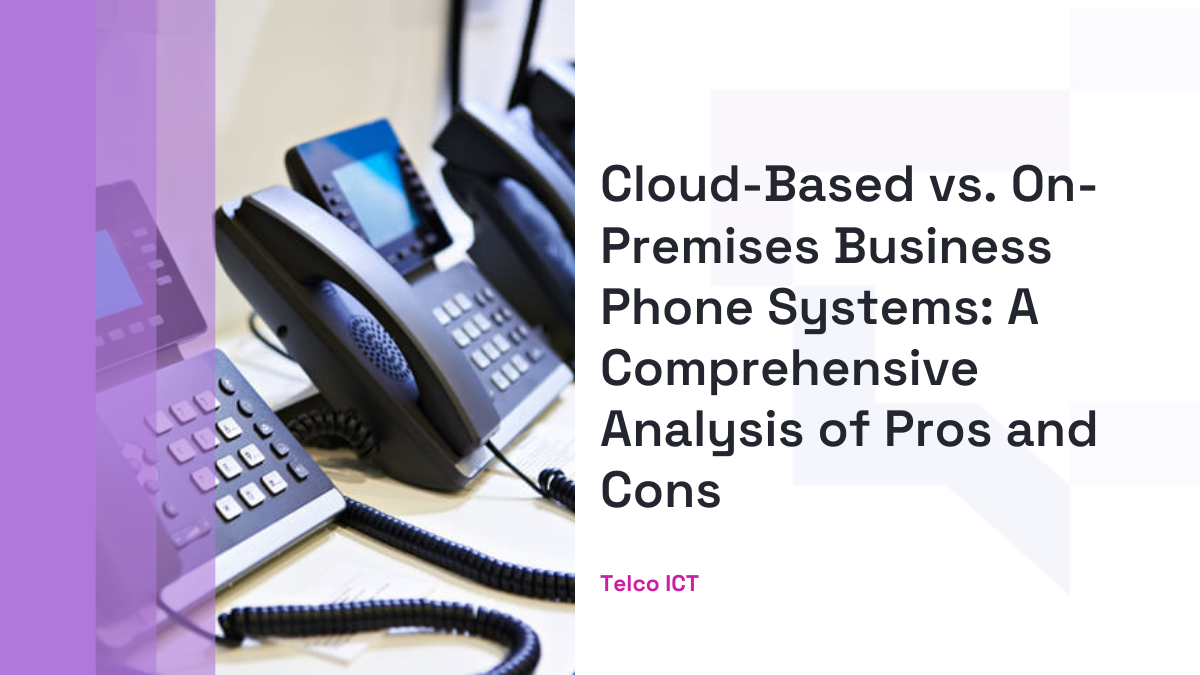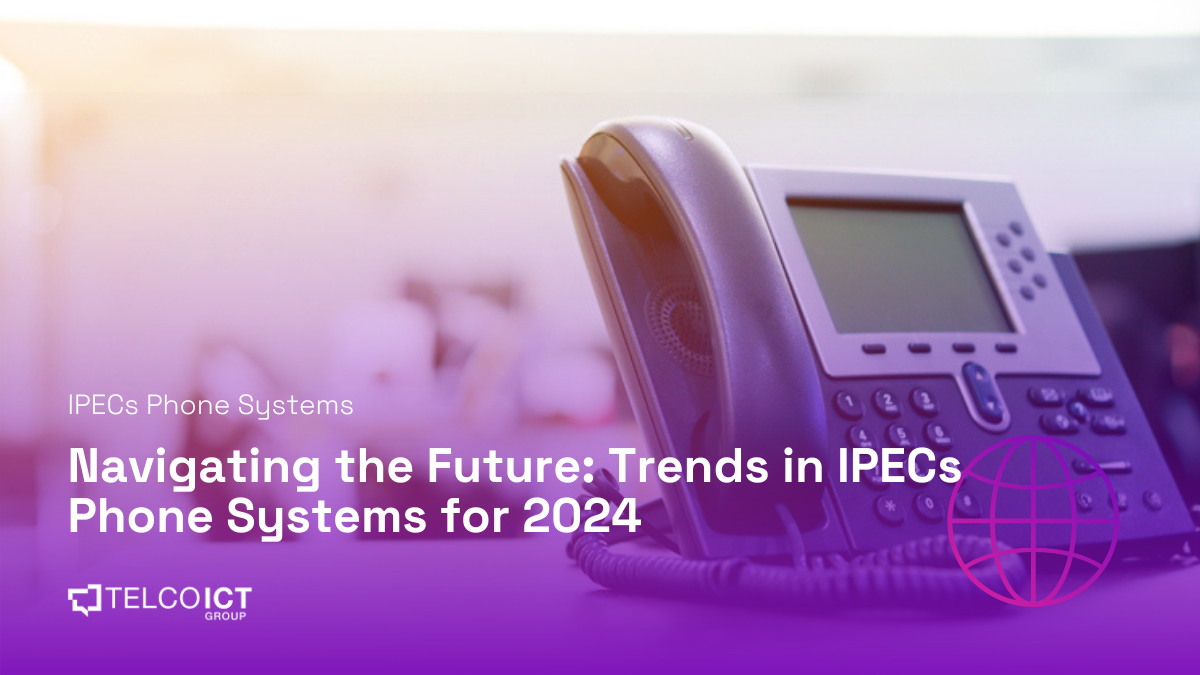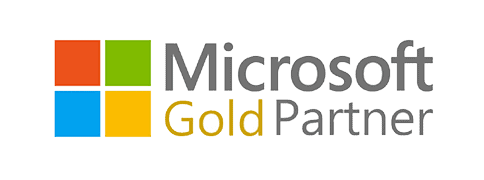All Posts / Cloud-Based vs. On-Premises Business Phone Systems: A Comprehensive Analysis of Pros and Cons
Phone System
Cloud-Based vs. On-Premises Business Phone Systems: A Comprehensive Analysis of Pros and Cons

Introduction:
In today’s fast-paced business world, choosing the right phone system can be a puzzling challenge for customers. The options seem endless, and the battle of Cloud vs. On-Premises Phone Systems rages on, and the customers who are not aware of technical jargons related to phone systems end up scratching their heads, unsure of which way to turn. But no worries! In this blog, we’re here to cut through the confusion and shed light on the pros and cons of both systems. We’ll help you make a decision with confidence. So, get ready to weigh the pros and cons of Cloud-Based Business Phone Systems and On-Premises! Let’s dive in!
What is a Cloud-Based Business Phone System?

A Cloud-Based Business Phone System, also known as a hosted VoIP (Voice over Internet Protocol) system, is a modern communication solution that operates through the internet. Unlike traditional on-premises phone systems, where the hardware and infrastructure are physically located within the organization’s premises, a cloud-based business phone system’s core components are housed in secure data centers managed by the service provider. This amazing setup can let your businesses access and manage your phone services through a web-based interface or mobile app, providing unlimited flexibility and mobility. Cloud-Based VoIP Solutions transmit voice and data as digital packets over the internet, enabling high-quality voice calls, video conferencing, messaging, and other communication features. The system’s architecture ensures seamless scalability, allowing businesses to add or remove phone lines and features as their needs evolve.
Moreover, the best part about the cloud-based business phone systems is that they are known for cost-effectiveness, as they eliminate the need for large upfront investments in hardware and maintenance. Instead, businesses pay a predictable monthly subscription fee, allowing for better budget management. Additionally, cloud service providers free up internal IT resources and ensure that the phone system stays up-to-date with the latest features and advancements. As a result, it’s not a surprise that Cloud-Based Business Phone Systems have become an increasingly popular choice for businesses of all sizes, providing them with an efficient, agile, and future-ready communication solution.
Pros of Cloud-Based Business Phone Systems
1. Cost-Effectiveness: One of the best parts about cloud-based business phone systems is their cost-effectiveness. Traditional on-premises systems often require big upfront investments in hardware, infrastructure, and licenses. In contrast, cloud-based systems follow a subscription-based model, eliminating the need for large initial capital expenditures. Businesses can spread their costs over time, making budgeting more predictable and allowing them to allocate resources wisely.
2. Scalability: Cloud-based systems offer amazing scalability, making them a perfect choice for businesses which are growing or experience fluctuations in communication demands. Organizations can easily add or remove phone lines and features based on their needs, without the need for extensive hardware upgrades or configuration changes. This flexibility allows businesses to respond rapidly to changing communication requirements and adapt to evolving market conditions.
3. Ease of Deployment: When it comes to business phone deployment options, a Cloud-Based VoIP Solutions is relatively super easy and quick. Cloud service providers handle the infrastructure setup and configuration, streamlining the deployment process. Businesses can start using the service in a matter of days, compared to the weeks or months required for on-premises systems. Well, time saved is money earned! This faster deployment ensures that businesses can quickly realise the benefits of the new communication platform.
4. Geographical Flexibility: Cloud-based business phone systems offer geographical flexibility, enabling employees to access the phone system from anywhere with an internet connection. This is particularly advantageous for businesses with remote or distributed teams, as employees can use their mobile devices or softphones to stay connected. Geographic barriers are minimized, boosting collaboration and enhancing overall productivity.
5. Automatic Updates and Maintenance: Cloud providers handle system updates and maintenance, ensuring that businesses always have access to the latest features and security patches. This proactive approach eliminates the need for manual updates and maintenance efforts on the part of the organization. IT teams can focus on more strategic initiatives, as routine phone system maintenance now becomes the responsibility of the service provider.
6. Advanced Features: Cloud-Based VoIP Solutions typically offer a wide range of advanced features, enhancing the overall communication experience. These features may include virtual attendants, call analytics, call forwarding, and integration with other communication tools like CRM software. Such features empower businesses to optimize their communication processes and better serve their customers. Explore the 3CX phone system by Telco ICT, which is a feature rich phone system and delivers a completely unified communications solution. Best part is it can be integrated with Microsoft Office 365, CRM and ERP systems too!
7. Disaster Recovery: Cloud-based business phone systems often come with built-in redundancy and data backup measures, improving the organization’s disaster recovery capabilities. In the event of a hardware failure or other disruptions, you can stay relaxed as the service provider can quickly reroute calls to alternative paths, minimising downtime and ensuring uninterrupted communication.
Cons of Cloud-Based Business Phone Systems
1. Dependence on Internet Connectivity: One of the primary concerns with cloud-based systems is their heavy reliance on stable internet connectivity. If the internet connection experiences outages or slowdowns, it can impact the quality and availability of phone calls. Although internet reliability has significantly improved, occasional disruptions can still occur, hampering communication efficiency.
2. Security Concerns: Storing data and communications in the cloud may raise security concerns for some organizations. While reputable cloud providers implement robust security measures, businesses need to ensure they choose a trusted provider with proper encryption, authentication, and compliance standards. Sensitive information transmitted through the cloud must be proactively protected from unauthorized access or data breaches.
3. Potential Downtime: While cloud providers strive for high uptime, occasional service outages or maintenance windows can still occur. These disruptions can temporarily hinder communication, affecting business operations and customer service. Businesses should inquire about the provider’s uptime guarantees and service level agreements (SLAs) to understand the potential impact on their operations.
4. Subscription Costs: Agreed! Cloud-based systems surely eliminate upfront hardware costs and businesses need to budget for ongoing monthly or annual subscription fees. Over time, these costs can add up, and organizations should carefully assess the long-term financial implications. It’s essential to compare the total cost of ownership of cloud-based systems with on-premises alternatives to make an informed decision.
5. Limited Control: Organizations using Cloud-Based VoIP Solutions have less control over the infrastructure and software, as everything is managed by the service provider. Customization options may be limited compared to on-premises solutions, potentially affecting specific workflows or integration requirements. Businesses must ensure that the cloud-based system can fulfil their specific communication needs without compromising essential functionalities.
In conclusion, cloud-based business phone systems offer numerous advantages in terms of cost-effectiveness, scalability, ease of deployment, geographical flexibility, automatic updates, advanced features, and disaster recovery capabilities. However, businesses need to consider the dependence on internet connectivity, security concerns, potential downtime, ongoing subscription costs, and limited control as they make their decision.
What is On-Premise Phone Systems?
On-Premises Phone Systems, also known as Private Branch Exchange (PBX) systems, are traditional communication setups where the entire phone infrastructure is physically located within the organization’s premises. Unlike Cloud-Based Business Phone Systems that rely on internet connectivity and external data centers, On-Premises systems host the hardware, software, and network components locally. This setup provides businesses with direct control over their communication infrastructure, making it an attractive option for those seeking enhanced data security and privacy. On-Premises Phone Systems transmit voice calls through a dedicated local network, ensuring high call quality and reliability even during internet outages. These systems offer a wide range of customization and integration options, allowing businesses to tailor their communication setup to specific needs and seamlessly integrate with existing systems. However, On-Premises Phone Systems require a significant upfront investment in purchasing the hardware and software licences, as well as ongoing maintenance and updates. Businesses must allocate dedicated IT resources to handle system upgrades, security patches, and hardware maintenance, which can be a challenge for smaller organizations with limited budgets and technical expertise.
In the following section, we will explore the advantages and disadvantages of on-premises business phone systems, providing a comprehensive analysis to help you weigh the options effectively and choose the most suitable deployment model for their communication needs.
Advantages of On-Premises Phone Systems
1. Full Control: With on-premises telephony infrastructure, businesses can have complete control over software, allowing for customization and tailored solutions. This level of control is particularly valuable for organizations with unique communication needs or specific regulatory requirements. IT teams can fine-tune the system to optimize performance and integrate it seamlessly with other on-premises applications.
2. Robust Security: Some organizations prefer on-premises systems as they can keep their data within their own physical boundaries, providing a sense of enhanced security. By maintaining data locally, businesses can implement their security protocols and ensure compliance with industry regulations more effectively. Additionally, on-premises systems are not as susceptible to external cyber threats compared to cloud-based systems.
3. No Dependence on Internet: On-premises business phone systems operate independently of internet connectivity, ensuring continuous communication even during internet outages. This self-reliance is beneficial for businesses located in areas with unreliable internet infrastructure or those that need guaranteed uptime for critical communication. On-premises systems function over traditional telephony lines or private networks, providing a stable communication environment.
4. Long-Term Cost Savings: While initial setup costs may be higher, on-premises PBX systems can offer cost savings over time, especially for large enterprises with a stable infrastructure. Once the initial investment is made, the ongoing operational costs are relatively predictable and may only involve occasional maintenance expenses. This predictability can be financially advantageous in the long run.
5. Integration with Existing Systems: On-site phone systems can integrate seamlessly with other on-premises communication tools and software, streamlining internal processes. This integration ensures smooth workflow across various departments and applications, facilitating unified communications and simplifying the user experience. Additionally, integration with customer databases and CRM systems can enhance customer interactions and lead to better customer relationship management.
Cons of On-Premises Phone Systems
1. High Initial Investment: On-premises business phone systems require significant upfront investments in hardware, software, and infrastructure. These costs can be particularly challenging for small and medium-sized businesses with limited budgets. The capital expenditure may also involve additional costs, such as hiring specialized IT staff to set up and maintain the system.
2. Maintenance and Updates: The responsibility of system maintenance, updates, and security patches lies with the organization, requiring dedicated IT resources and expertise. This ongoing maintenance can be time-consuming and may lead to unexpected costs in the event of hardware failures or other issues. Regular updates and hardware upgrades are essential to ensure optimal performance and security.
3. Limited Scalability: Expanding an on-premises phone system can be a complex and time-consuming process. Thus, limited scalability counts as one of the significant on-site phone system drawbacks for businesses which are rapidly growing. For instance, additional hardware and licenses may need to be purchased, and configuration changes can be cumbersome. Scaling the system requires careful planning and foresight to avoid potential disruptions.
4. Geographical Limitations: On-premises business phone systems are location-bound, which can be a disadvantage for businesses with remote or distributed teams. Providing consistent phone service to employees across different locations requires intricate network setups, which may incur higher costs and complexities.
5. Lack of Redundancy: Irrespective of size or type, all business go through downtime due to hardware failure or natural disaster. In such situations, restoring communication capabilities may take time and effort. Implementing redundancy measures, such as backup systems or alternative communication channels, is essential to ensure business continuity. On-site phone systems cannot be relied on when it comes to fighting downtime.
Comparing Cloud and On-Premises Phone Systems
We have examined the pros and cons of on-premises business phone systems. These solutions offer advantages such as full control, enhanced security, independence from internet connectivity, potential long-term cost savings, and seamless integration with existing systems. However, they also come with challenges, including high initial investments, ongoing maintenance responsibilities, limited scalability, geographical limitations, and the need for robust redundancy planning.
To make an informed choice between cloud-based and on-premises phone systems, businesses must carefully evaluate their unique requirements, budget constraints, IT capabilities, growth plans, security needs, and workforce distribution. Understanding the specific advantages and drawbacks of each deployment option will help organizations choose the solution that best aligns with their communication objectives and overall business strategy.
Ultimately, weighing all options before choosing between cloud and on-premises phone systems will have a significant impact on an organization’s communication efficiency, flexibility, security, and long-term costs. By thoroughly analyzing the pros and cons of both options and considering their business needs, companies can confidently select the most suitable business phone system deployment model for their present and future communication needs.
Differences between On-Premises and Cloud-Based Business Phone Systems
In the above sections, we have explored the pros & cons of On-Premises and Cloud-Based Business Phone Systems. Since these two options offer distinct features and functionalities, catering to different business needs and preferences; it’s crucial to explore the key differences between On-Premises and Cloud-Based Business Phone Systems to get more clarity and make an informed decision for your business.
1. Infrastructure Location: The fundamental difference between On-Premises and Cloud-Based Business Phone Systems lies in the location of the infrastructure. On-Premises Phone Systems host all hardware, software, and network components within the organization’s premises. In contrast, Cloud-Based Business Phone Systems rely on external data centers, with service providers managing and maintaining the infrastructure off-site.
2. Cost Considerations: On-Premises Phone Systems often demand significant upfront capital expenditures, including the purchase of hardware, software licenses, and ongoing maintenance costs. In contrast, Cloud-Based Business Phone Systems operate on a subscription-based model, allowing businesses to pay a predictable monthly fee. This cost-effective approach is particularly advantageous for small and medium-sized enterprises with budget constraints.
3. Flexibility and Scalability: Cloud-Based Business Phone Systems have a clear advantage in terms of flexibility and scalability. Businesses can easily scale their communication setup up or down, adding or removing phone lines and features to adapt to changing needs. In contrast, On-Premises Phone Systems may face scalability challenges, requiring additional hardware investments and manual configurations to accommodate growth.
4. Mobility and Remote Work: Cloud-Based Business Phone Systems offer unmatched mobility, allowing employees to access communication services from anywhere with an internet connection. This flexibility fosters remote work arrangements, contributing to improved work-life balance and increased productivity. On-Premises Phone Systems, on the other hand, are confined to the office location, limiting the ability to support remote work effectively.
5. Maintenance and Updates: Cloud-Based Business Phone Systems relieve businesses of the burden of maintenance and updates. Service providers handle system updates, security patches, and hardware maintenance, ensuring the system remains up-to-date with the latest features and advancements. On-Premises Phone Systems require internal IT teams to manage updates and maintenance, diverting resources from other critical tasks.
6. Data Security and Control: On-Premises Phone Systems offer businesses greater control and direct oversight of their data. Since all information remains within the organization’s physical premises, businesses with strict data compliance requirements may prefer this option. Cloud-Based Business Phone Systems have implemented robust security measures, but some businesses may still have concerns about data security when transmitting sensitive information over the internet.
7. Reliability: On-Premises Phone Systems typically boast high call quality and reliability, as calls are transmitted over a dedicated local network. In contrast, Cloud-Based Business Phone Systems’ reliability is dependent on internet connectivity, which may be a concern in areas with weak internet infrastructure.
Conclusion:
In conclusion, the choice between On-Premises and Cloud-Based Business Phone Systems depends on an organization’s unique requirements, budget, and long-term vision. On-Premises systems offer greater data control and privacy but come with higher upfront costs and maintenance responsibilities. As businesses’ communication needs continue to evolve and remote work becomes more prevalent, On-Premises Phone Systems face competition from Cloud-Based alternatives, which offer greater flexibility, scalability, cost-effectiveness and simplified maintenance. Nonetheless, some organizations, especially those with strict data compliance requirements and a preference for in-house control, continue to opt for On-Premises Phone Systems to meet their specific communication needs.
As businesses continue to adapt to the evolving communication landscape, understanding these key differences is essential in making the right decision for a reliable and efficient communication infrastructure.
Whether it’s On-premise or Cloud-Based Business Phone System, the right decision made by you today will pave the way for effective and seamless communication for your business in upcoming years. If you need the right assistance to make an informed decision, explore the business phone systems of Telco ICT or contact Telco ICT experts. In the past 25+ years, we have helped several global clients in choosing the right business phone system based on their unique business need and budget.
Table of contents
Related Posts
We’ll handle the tech
so you can get on with
running your business.

CALL US
1300 414 214
Our Trusted Partners
Contact Us
Let’s Talk
Common Questions
Do you outsource your work overseas?
No. We use local teams only. That way we can respond more quickly to any problems that may occur. We want your tech running smoothly so you can focus on what you do best.
Is your support 24 hours?
Yes. We have people available whenever you need us. We understand that your tech runs 24 hours, and you need it be working at all times.
Are your services customised for my business?
Yes. There is great off the shelf software. But we know one size never fits all. So anything we set up for you is designed to make your business run smoother and in the way you want it to.
Are your services expensive?
No. Reliable tech is the life blood of your business. We keep it running smoothly so your business can keep making money. All our services are fixed fees, so you never get any nasty surprises.
What’s the next step?
Simply book a chat with one of our experts. We’ll have a chat about exactly what you need and how we can help. If you like our approach then we’ll give you a fixed price quote and get everything up and running for you, fast!








